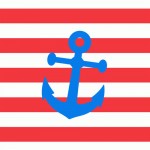Ahoy there … 9 Fascinating Nautical Terms

Britain is a nautical nation. Indeed her Empire was built on the command of the seas. So it’s not surprising that the nautical world has contributed many of it’s specialised terms to the English language, terms we use every day often without knowing their true meaning or origin. In this article we’ve brought together some of those terms to help you ‘navigate’ the world of ‘Nautical Speak’.
NAUTICAL BABBLE
Scuttlebutt [skuht-l-buht]
Most of us know the term scuttlebutt as a folksy way to refer to rumour or gossip, but in nautical nomenclature, a scuttlebutt is an open cask of drinking water or a drinking fountain. The former definition evolved out of the nautical sense, as sailors would engage in idle chat while gathered around their version of the office water cooler.
Moonraker [moon-rey-ker]
In sailing, a moonraker is a light square sail set at the top of the mast. But this term is also a demonym for people from Wiltshire, England. As the story goes, a few men from Wiltshire were discovered trying to rake the moon’s reflection out of a pond. However, if you ask a Wiltshire native, he or she might tell you another version of the story: the men were raking a pond for kegs of smuggled brandy, and when authorities appeared, the rakers feigned madness.
Landlubber [land-luhb-er]
If the phrases “flying the spinnaker” and “douse the jib” strike you as Jabberwocky, you might be a landlubber. This term refers an unseasoned sailor or someone unfamiliar with the sea. The second element of this compound, lubber, has been used in various constructs throughout the years, most notably abbey-lubber, referring to a lazy monk, and Lubberland, an imaginary land of laziness.
Sea Dog
The opposite of a landlubber might be called a sea dog, defined as “a sailor, especially an old or experienced one.” The term can also refer to a pirate, a harbour seal, or a luminous appearance near the horizon, such as meteor, regarded by mariners as an omen of bad weather.
Fathom [fath-uhm]
Most of us know fathom as a verb, meaning “to penetrate to the truth of” or comprehend. But the sea dogs out there know that a fathom is also a unit of length, used primarily in nautical measurements, equal to 6 feet. This length is an approximation of the length of outstretched arms, which brings us to the Old English word meaning “span of outstretched arms.” The verb sense comes from Old English meaning “to embrace, surround, envelop.”
Chockablock [chok-uh-blok]
This fun-to-say adjective means “extremely full” or “jammed,” as in “This park is chockablock with puppies.” But if those puppies are on a boat, you might want to find another term to describe the state of canine crowding. In a nautical context, chockablock means “having the blocks drawn close together, as when the tackle is hauled to the utmost.”
Flotsam [flot-suhm]
Flotsam is a legal term that refers to wreckage of a ship and its cargo found floating on the water. It’s often used in conjunction with jetsam, another word from maritime law that refers to goods cast overboard deliberately which sink or wash ashore. The phrase flotsam and jetsam is often used to refer to useless or unimportant items or odds and ends.
Groggy [grog-ee]
The term groggy means dazed and weakened or intoxicated, the way one might feel after he or she partakes in a goblet full of its root word grog, which is a mixture of rum and water. The term grog is a reference to a British admiral who ordered his sailors’ rum to be diluted; he was nicknamed Old Grog because he wore a grogram cloak.
Bumpkin [buhmp-kin]
In sailing, a bumpkin is a beam or spar projecting outward from the hull of a vessel. Outside of a nautical context, it refers to an awkward, simple rustic or yokel. The Dutch word boomken, which means “little tree,” may bridge the gap between the two meanings as it appears to have been used to refer to a short stumpy man.






